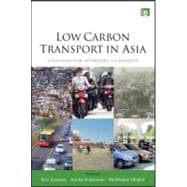
Note: Supplemental materials are not guaranteed with Rental or Used book purchases.
Purchase Benefits
What is included with this book?
| List of figures | p. vii |
| List of tables | p. ix |
| List of contributors | p. xi |
| Foreword | p. xiv |
| Preface | p. xvi |
| Acknowledgements | p. xxii |
| Abbreviations | p. xxiv |
| Introduction | p. 1 |
| Low carbon transport and co-benefits in Asia: an overview | p. 3 |
| Analytical frameworks | p. 19 |
| The co-benefits of transport policies in Asia: a review of the literature | p. 21 |
| Maximising the co-benefits of light-duty dieselisation in Asia | p. 45 |
| Reducing particulate matter emissions from buses and trucks in Asia: a framework to assess air pollution and climate change co-impacts | p. 68 |
| Case studies | p. 95 |
| Quantifying co-benefits from low carbon transport in Hanoi, Vietnam | p. 97 |
| Analyzing the co-benefits of transport policies in Hyderabad, India | p. 119 |
| The co-benefits of a city toll in Beijing: barriers and solutions | p. 135 |
| Integrating land use, transport, energy, and the environment: the case of Bandung, Indonesia | p. 159 |
| Enabling fuel switching in Pakistan: a case study of compressed natural gas | p. 179 |
| The co-benefits of Jakarta's Bus Rapid Transit: getting the institutions right | p. 191 |
| International initiatives and the way forward | p. 211 |
| Japan's approach to co-benefits: recognition, implementation, and evaluation | p. 213 |
| International climate change initiatives and low carbon transport in Asia: perspectives and prospects | p. 225 |
| Low carbon transport and co-benefits in Asia: the way forward | p. 244 |
| Index | p. 263 |
| Table of Contents provided by Ingram. All Rights Reserved. |
The New copy of this book will include any supplemental materials advertised. Please check the title of the book to determine if it should include any access cards, study guides, lab manuals, CDs, etc.
The Used, Rental and eBook copies of this book are not guaranteed to include any supplemental materials. Typically, only the book itself is included. This is true even if the title states it includes any access cards, study guides, lab manuals, CDs, etc.